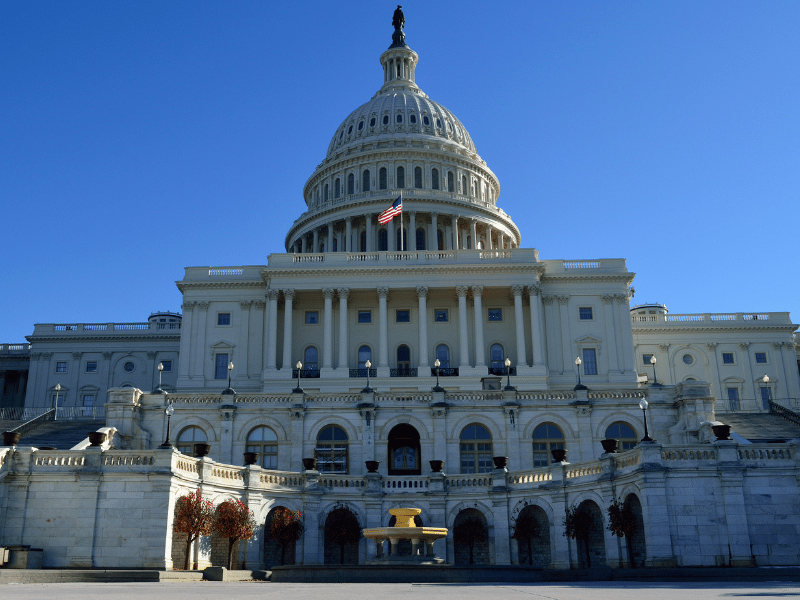By Rick Manning
It is time for the Republicans in Congress to recognize that their colleagues across the aisle are trying to negate the 2022 election by extending their policy priorities through most of 2023 using the appropriations funding process.
The power of the purse was presumed to be the most powerful power of them all by the framers of the Constitution and it was given specifically to Congress. And it is this power of the purse that everyone focuses upon when we have periodic so-called government shutdowns.
Here is how things are supposed to work.
The House of Representatives is supposed to pass thirteen individual appropriations bills covering the entire spending by the federal government. The Senate then considers each of those bills making changes that under Senate rules require a filibuster proof majority of 60 votes. The House then either accepts or rejects the Senate amendments, and if they reject them, they negotiate the differences through a Conference committee of the two houses. The resulting conference report then goes back to the Senate and House and passes.
At that point, once each of the funding bills passes Congress, it is sent to the President to either sign or veto. If the President signs it, that is both how and how much money is to be spent in that area of government through the next fiscal year – October 1 to September 30.
If the President vetoes the bill, Congress can either muster a 2/3 vote in both the House and Senate to override the veto or go back to the drawing board to find funding levels that the President and Congress can agree upon. President Trump got almost 500 miles of border wall built by insisting that the funding be included through this process which Democrats in Congress decided to try to block by denying funding to the rest of the government. Eventually, some, but not enough, funding was provided for the wall and other border security measures.
This appropriations process is supposed to happen 13 times covering everything from Defense to the Labor Department and when it was completed, the entire funds for the government were set.
Today, only about 30 percent of total federal government spending is decided by this process as things like Medicare, Social Security, Food Stamps, Veteran’s Benefits and Interest payments on the national debt all have been deemed mandatory by Congress and as a result, not subject to annual review by those elected to protect the federal treasury.
As we find ourselves at the midway point of September, Congress is beginning to engage in the public part of this appropriations process. Of course, this process does not much resemble the ideal laid out above.
Rather than pass 13 bills, Congress is likely to try to pass one, in this case called a Continuing Resolution or CR. A CR merely extends the existing levels of spending forward for a specific time allowing Congress and the White House additional time to agree upon the government-wide spending levels and any limitations on how that money should be spent.
Issues like whether all COVID mandates should be lifted on federal government contractors, whether the federal government should conduct an audit of all federal workers to determine if they have actually been logging in to their computers while working remotely, or if funding should be cut for the Internal Revenue Service to stop the hiring of 83,000 new auditors are just a few of thousands of issues that Republican and Democrat negotiators are trying to reconcile.
Another major issue that usually is just an afterthought will be whether the CR will extend for a couple of months to December (giving the Democrats the opportunity to dictate terms in the funding debate before their hoped for departure from the majority in Congress) or into March, allowing the new Congress to decide the funding for the second half of the fiscal year.
There simply is no excuse for the GOP leaders to not bet on themselves by insisting on a six-month CR. If they fail to win in the November elections, little is changed from the deal they negotiate with Biden, Schumer and Pelosi. But if they do, they will have the ability to use the power of the purse that they won fair and square to begin the process of putting some guardrails into place against Biden’s policies to dramatically expand the size and scope of government.
For example, if they take control of the House or Senate, Republican committee chairmen can immediately begin to hold immigration officials accountable for the Biden border failures and reallocate funding to force changes. If Biden objects and vetoes the bill, he will “shut down” approximately 17 percent of the government and every illegal immigrant who crosses and is sent to DC, New York City or Chicago, will be highlighted as directly due to his failed open borders vision. If Biden wants open borders let him shut down the government to keep them open.
If the Republicans don’t gain a majority in November, then they can work in the minority to try to shape policy but do so from a position of profound weakness as their only block of existing policy is to deny the Biden administration 60 votes in the Senate to fund it. And the ugly truth is that Biden can buy enough Senate Republicans to vote for his policies simply by throwing a few more billion to the Pentagon.
The government funding fight is now. The GOP holds a pretty weak hand with only the threat of filibuster in the Senate threatening passage of grotesque funding proposals. However, if they hold firm and force a six-month Continuing Resolution, there is hope that the massive wide-spread federal power grabs that the Biden administration is conducting will be financially strangled in March of 2023 should the GOP take control of Congress.
Will the Republicans fight to preserve their ability to direct federal government policies through the power of the purse should they win? Or will they just defer to their “friends across the aisle” and allow them to continue to run the table on them both fiscally and from a policy perspective?
The next two weeks will determine if they even fight for their right to lead from day one in 2023, should they get elected.
Rick Manning is President of Americans for Limited Government







